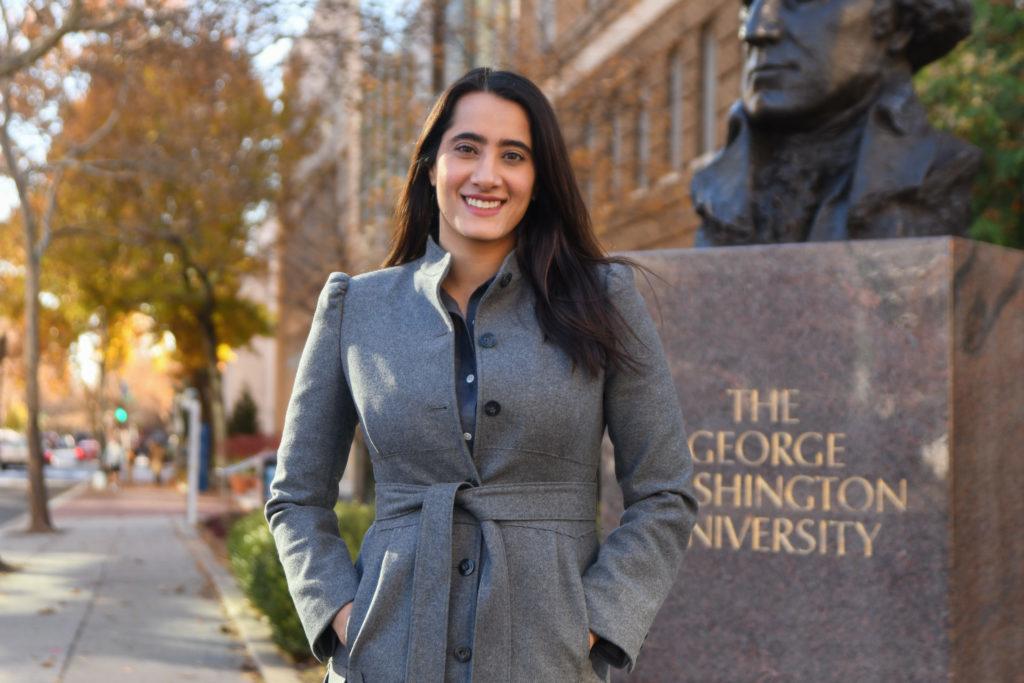A psychology professor is spearheading one of the country’s first-ever interfaith anti-bullying summits this weekend on the Mount Vernon Campus.
About 100 researchers, professors and students will come together in Ames Hall this weekend to discuss rising discrimination and stereotyping of people of different faiths and how it can lead to bullying. Summit organizers said the event will draw attention to a nationwide bullying problem, which can cause students to question their identities from a young age and feel excluded based on their faith.
Rukhsana Chaudhry, an assistant professor of clinical psychology and the mental health programming director of American Muslim Health Professionals, is leading the summit. She said the topic was especially important given a recent spike in religion-based hate crimes across the country.
She said the summit will feature workshops and breakout sessions where individuals can role play different positions in a bullying situation and then discuss the role of education in solving religion-based bullying problems. During the summit, attendees will also hear from bullying survivors and activists.
“When it comes to faith-based bullying, religious-based bullying, it has not really gotten under the radars of a public health issue,” Chaudhry said. “We’ve seen increased amounts of students who experience alienation, further marginalization, not just in their school but actually in their community because of their difficulty dealing with their identity, as whatever faith background they come from.”
The summit is co-sponsored by several faith-based organizations, including the Hindu American Foundation, Sisterhood of Salaam Shalom and the National Baptist Convention.
Chaudhry said the summit first started as an idea in 2016 when the American Muslim Health Professionals made youth issues and advocacy a top priority and launched a speaker series with Muslim youth. Throughout the campaign, the group heard more stories from people of other faiths, like those of the Jewish community, and leaders thought pursuing a summit to address religion-based bullying across all communities would be the next best step.
“We saw a lot of youth dealing with issues of identity, dealing with stereotypes – combatting stereotypes of course – but really working to find themselves in a climate where they were experiencing more discrimination,” she said.
Chaudhry said some students and intellectuals from different faith groups across the country will attend the summit. She said the event is being held in Ames Hall because it’s a good location in the District and her department is co-sponsoring the event.
“Some people are lucky to have a family or a support system that is strong enough to lift them up, but a lot of people are not – a lot of people don’t have that,” she said. “So they keep it to themselves, they keep silent, and then it continues, and it perpetuates the idea that society does not accept you as you are and further alienates them into adulthood.”
Hana Kaur, a 17-year-old high school student from Maryland and a representative of Sikh Kid 2 Kid, a youth-based organization that focuses on education about the Sikh culture and religion, will moderate the main panel about looking into the mind of a bully. She will also host a presentation about what it means for a student to advocate for themselves. She said the panel is important to her because she saw her friends and family members targeted after the 9/11 terrorist attacks.
“A lot of faiths, including Sikhism, have these identities that are meant to be so empowering,” she said. “I felt like when you’re in such a space when that empowerment is taken away from you because of something like bullying, that was kind of like robbing students and people from achieving their full potential and being unapologetically themselves.”
Iman Jandali, the executive coordinator for American Muslim Health Professionals, said issues surrounding faith-based bullying have increased under the Trump administration. She said the administration has normalized bullying – which she hopes the summit helps to combat.
As a candidate, President Donald Trump frequently disparaged Muslims. He retweeted anti-Islam videos from a far-right British political figure Wednesday.
“We’re really hoping that it’s more than just a summit or conference but really an opportunity to talk about bullying and the evidence around its triggers the environment that creates opportunities for students to bully and what we can do as community leaders, activists, faith leaders to really put a stop to bullying and prevent it,” Jandali said.
Sumi Mukherjee, an anti-bullying advocate and the keynote speaker for the summit, said he hopes he can connect with minority individuals in the audience who may have also been bullied for their faith or race and share the message that bullying can have tangible effects on a person’s mental health.
But he hope that attendees come away from the conference with a “sense of hope.”
“It can be a very evil world, but there’s also a lot of good in this world, and we all have the power within us to take whatever horrible things happen to us and try to turn them into something positive,” he said.
Dani Grace and Rebecca Leppert contributed reporting.





